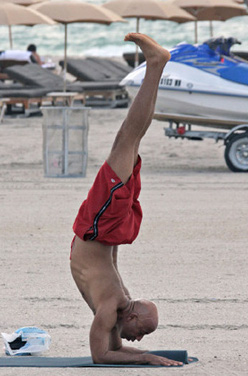In this exclusive interview, Russell Simmons kicks knowledge on getting money, happiness, and success through stillness.
Russell Simmons, the co-founder of Def Jam, has an astute business acumen that’s made him one of the most successful businessmen in the game. He’s built empires that span a variety of industries, including fashion, film, music, digital media, and financial services. It’s his personal undertakings, however, that have afforded him his greatest successes. Those personal undertakings? Yoga and meditation.
“I discovered meditation through my yoga practice. Meditation is the most powerful part of yoga. I started going to yoga because of the hot girls, and I got addicted,” Simmons laughs. The idea of being present, and not being rushed, was so appealing to me. I was running around frantically at the time. Meditation, it’s benefitted me greatly. You can’t get no money when you’re living in the past or the future. You’ve gotta be present.”
For a man nicknamed Rush, slowing down seemed to be counterintuitive–and counterproductive–to all that he was trying to–and did–accomplish. Yet Simmons stuck with it, and now credits his success to his ability to be still. ”It changes everything. It’s helped me with everything. Business–and life–is all about the choices you make. When you can clear the noise from your mind, you’e able to be more thoughtful. When emotions and emotional attachment to the world aren’t clouding your judgment, you can make better decisions,” he explains.
What started as a way for him to meet hot girls gave way to a passion that has changed his life–and he hopes, the lives of others. He recently published a new book, Success Through Stillness, that offers his breakdown of meditation made easy, making it an invaluable tool that’s accessible to anyone, anywhere, Russell Simmons style.
The Source sat down with Uncle Rush to talk to him about meditation, his book, and how these things changed his life–and, how they can change yours, too.
What is meditation?
Meditation is the idea of quiet time. You work your muscles out daily, you brush your teeth daily, but you don’t do anything for your brain. Fluctuation of the mind is the cause of all suffering. The present moment is happiness. Getting rid of the noise in the mind is happiness. If you’re sad, if you’re depressed–there’s noise in the mind. People try drugs and alcohol, and even exercise, to release endorphins to kind of counteract that noise. The truth is that nothing promotes happiness like a quiet mind. You just sit and repeat a mantra. It’s not difficult.
Should everyone meditate?
Absolutely. Everyone, everywhere. The process of smiling and breathing is good for anyone. Both my daughters meditate; my littlest daughter started when she was 8. Her mother said “You better sit down and do it.” Now she loves it, and we do it together. Meditation is a way to be in an awakened state. All the prophets have promoted it in every religion. It’s an invaluable resource, with so many benefits. We haven’t been passing it to our children. I actually just spoke to the mayor of Chicago about getting meditation in the schools over there, because meditation has been proven time after time to reduce violence. It’s science.
So what are the real world benefits of meditation?
Meditation can lower your blood pressure. It increases the grey matter in your brain, and increases your brain functioning. You’ll be able to see miracles unfolding instead of being so caught up in the fluctuations of the mind that you miss everything. It’s the greatest way to promote happiness and clarity. With clarity also comes better decision making.
When you are able to watch your thoughts, you can make decisions without all that background noise in your head. You’re more intuitive. You’re more confident. You’re able to make better choices instead of the world making choices for you. When you sit in meditation and the mind settles, and thoughts begin to come and go, you see them without emotion. You don’t get to prejudge or make decisions based off of emotions. Baggage affects your choices, you know. Experiences are color for the moment, and when you’re so focused on the colors of the past, it makes it difficult to accurately assess the colors of the present moment. Once we’re relieved of the anxiety from the past by being in the present moment–and only in the present moment–we make better decisions.
Many yogic traditions emphasis the importance of breathing during meditation. If you’re not familiar with breathing techniques or yoga, how can someone be mindful of their breathing in their meditation practice?
Yes, some people meditate solely on the breath. You can inhale “Let” and exhale “go.” Over and over.
 Did you face any resistance to developing a regular practice?
Did you face any resistance to developing a regular practice?
No, from the first class I took, I got high as hell, and stuck with it, and did it every day. I do it every day.
What advice do you have for people who have resistance to making meditation a part of their regular routine? The people who don’t have time, are too tired, too busy, too whatever, to practice?
Remember how you feel after class or after you sit and practice. I guarantee you feel inspired, uplifted, awakened, happy and clear. You’re never too tired or too busy to feel like that! You’re too tired and too busy because you don’t feel like that. And you have the ability to make that happen for yourself. So why not? Do you want to be inspired, uplifted, happy, and clear? Or do you want to be slouching, tired, frantic?
What tips can you offer, for anyone who wants to begin, or even improve, a meditation and/or yoga practice?
Consistency is good; consistency matters. Posture is important. No slouching! If you sit up erect in a perfect asana (pose), you’re more likely to have a clearer meditation. Always feel your body, and listen to your body. The “meditation pose” may not feel natural at first, but physical practice helps achieve that alignment. It’s called practice for a reason–it’s something you can always improve, and it does take practice. But it’s so easy, that anyone can do it. Oh, and breathe, and smile!
A big shoutout to Uncle Rush for taking the time out of his busy schedule to share the gift of meditation with us. As he said during the interview, “I don’t own meditation. I’m ‘sharing’ it with you. Giving consciousness is the greatest gift.”
For more tips from Russell Simmons, check out his book, Success Through Stillness, here. All proceeds from his books are donated to charity.
April Dawn (@scarlettsinatra)




